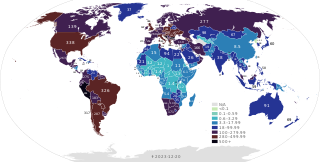
A state of emergency is a situation in which a government is empowered to put through policies that it would normally not be permitted to do, for the safety and protection of its citizens. A government can declare such a state during a natural disaster, civil unrest, armed conflict, medical pandemic or epidemic or other biosecurity risk.

The COVID-19 pandemic, also known as the coronavirus pandemic, is an ongoing global pandemic of coronavirus disease 2019 (COVID-19) caused by severe acute respiratory syndrome coronavirus 2 (SARS-CoV-2). The novel virus was first identified in an outbreak in the Chinese city of Wuhan in December 2019. Attempts to contain it there failed, allowing the virus to spread to other areas of Asia and then worldwide in early 2020. The World Health Organization (WHO) declared the outbreak a public health emergency of international concern (PHEIC) on 30 January 2020. The WHO ended its PHEIC declaration on 5 May 2023. As of 19 December 2023, the pandemic has caused 772,385,305 cases and 6,987,209 confirmed deaths, ranking it fifth in the list of the deadliest epidemics and pandemics in history.

This is a general overview and status of places affected by severe acute respiratory syndrome coronavirus 2 (SARS-CoV-2), the virus which causes coronavirus disease 2019 (COVID-19) and is responsible for the COVID-19 pandemic. The first human cases of COVID-19 were identified in Wuhan, the capital of the province of Hubei in China in December 2019.

The article contains the number of cases of coronavirus disease 2019 (COVID-19) reported by each country, territory, and subnational area to the World Health Organization (WHO) and published in WHO reports, tables, and spreadsheets. As of 19 December 2023, 772,385,305 cases have been stated by government agencies from around the world to be confirmed. For more international statistics in table and map form, see COVID-19 pandemic by country and territory.
The timeline of the COVID-19 pandemic lists the articles containing the chronology and epidemiology of SARS-CoV-2, the virus that causes the coronavirus disease 2019 (COVID-19) and is responsible for the COVID-19 pandemic.

The global COVID-19 pandemic arrived in Europe with its first confirmed case in Bordeaux, France, on 24 January 2020, and subsequently spread widely across the continent. By 17 March 2020, every country in Europe had confirmed a case, and all have reported at least one death, with the exception of Vatican City.

The COVID-19 pandemic in the United Kingdom is a part of the worldwide pandemic of coronavirus disease 2019 (COVID-19) caused by severe acute respiratory syndrome coronavirus 2 (SARS-CoV-2). In the United Kingdom, it has resulted in 24,812,582 confirmed cases, and is associated with 232,112 deaths.

The first cases of the COVID-19 pandemic of coronavirus disease 2019 in North America were reported in the United States on 23 January 2020. Cases were reported in all North American countries after Saint Kitts and Nevis confirmed a case on 25 March, and in all North American territories after Bonaire confirmed a case on 16 April.

The COVID-19 pandemic in the Republic of Ireland is a part of the worldwide pandemic of coronavirus disease 2019 (COVID-19) caused by severe acute respiratory syndrome coronavirus 2 (SARS-CoV-2). In Ireland, it has resulted in 1,725,026 cases and 9,366 deaths.
The COVID-19 pandemic in British Columbia forms part of an ongoing worldwide pandemic of coronavirus disease 2019 (COVID-19), a novel infectious disease caused by severe acute respiratory syndrome coronavirus 2 (SARS-CoV-2). On January 28, 2020, British Columbia became the second province to confirm a case of COVID-19 in Canada. The first case of infection involved a patient who had recently returned from Wuhan, Hubei, China. The first case of community transmission in Canada was confirmed in British Columbia on March 5, 2020.

The COVID-19 pandemic has had a deep impact on the Irish economy, leading it into a recession. Essential public health measures announced by the Irish Government to contain the spread of COVID-19 resulted in the largest monthly increase in unemployment in the history of the Republic of Ireland during March 2020. By 24 April, there were more than one million people in receipt of support interventions to the labour market, including those in receipt of the COVID-19 Pandemic Unemployment Payment and the COVID-19 Temporary Wage Subsidy Scheme. While there were job losses in all sectors, individuals working in tourism, hospitality, food and retail have seen the largest job losses.

The COVID-19 vaccination programme in the United Kingdom is an ongoing mass immunisation campaign for coronavirus disease 2019 (COVID-19) during the COVID-19 pandemic in the United Kingdom.

The Alpha variant (B.1.1.7) was a SARS-CoV-2 variant of concern. It was estimated to be 40–80% more transmissible than the wild-type SARS-CoV-2. Scientists more widely took note of this variant in early December 2020, when a phylogenetic tree showing viral sequences from Kent, United Kingdom looked unusual. The variant began to spread quickly by mid-December, around the same time as infections surged.

This is a timeline documenting events of jazz in the year 2021.

The COVID-19 vaccination programme in the Republic of Ireland is an ongoing mass immunisation campaign that began on 29 December 2020 in response to the COVID-19 pandemic in the Republic of Ireland. Ireland's vaccination rollout has been praised as one of the most successful rollouts in the world and was ranked number one in the European Union in terms of its percentage of adult population fully vaccinated, and was also ranked number one in the EU for the number of booster vaccines administered.
The following is a timeline of the COVID-19 pandemic in the United Kingdom in 2023.










